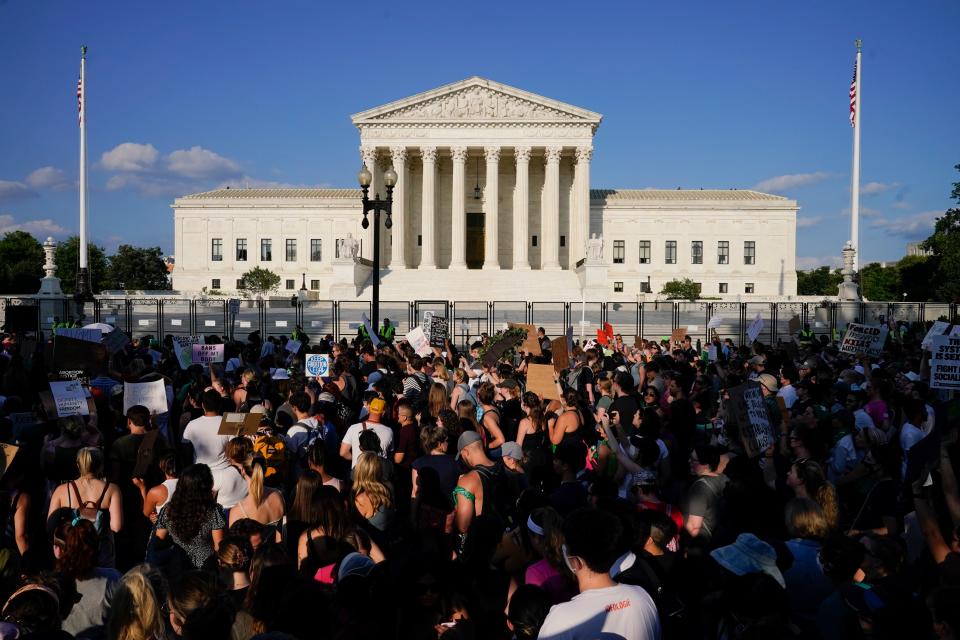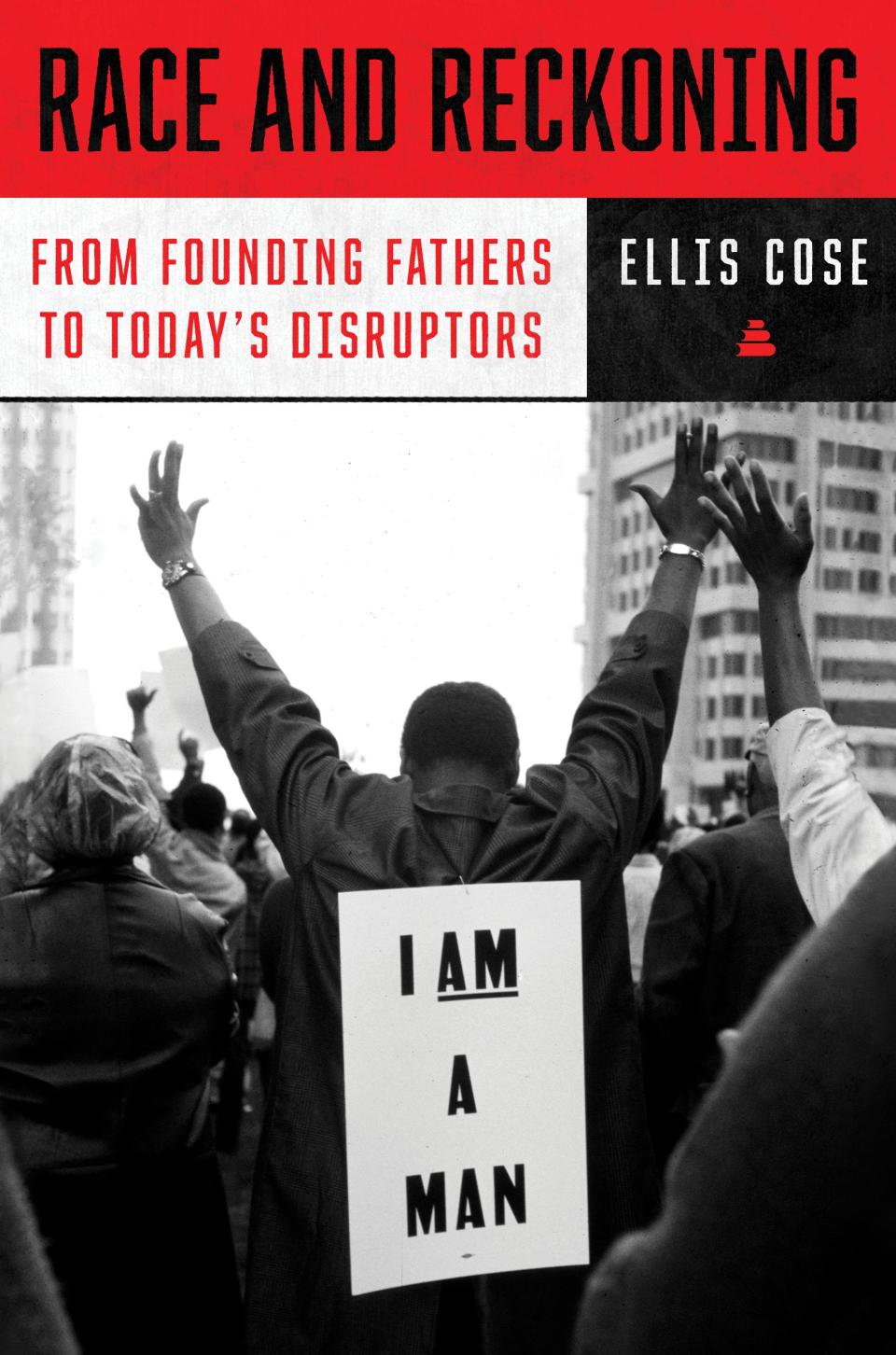Democracy crisis existed in America long before Trump became president. How do we fix this?
- Oops!Something went wrong.Please try again later.
Ever since Donald Trump hijacked the Republican Party, assorted intellectuals have warned about a looming constitutional crisis – about the possibility that, through sheer bullheadedness and irresponsibility, Trump might throw America into chaos.
Countless words were written about that frightening possibility, particularly after Trump refused to concede the presidency and let loose a mob to enforce his intransigence. It therefore may come as news that the crisis has already arrived. Indeed, it arrived even before Trump became president.
It is not so much a constitutional crisis as a democracy crisis; and it is not just about a president overstepping his bounds but about government falling into the hands of a grievance-fueled minority determined to force its will on the country regardless of the consequences.
'Depending on whether slaves are counted'
A recent indication is the Supreme Court handing down a decision declaring that neither the Founders nor those who amended their work wanted the federal government in the business of sanctioning abortion – even if ordinary people were just fine with that. Many Americans, apparently unaware that justices can see into the minds of the Founders, were shocked the court would do such a thing.

Interstate abortion travel bans?: We're supposed to be a free country, not East Germany
But this democracy crisis has loomed in plain sight for some time. We just never paid it much mind. Instead, we became the proverbial frog in the pot. We stayed in the water because the heat rose so gradually that we only realized belatedly we were being boiled alive.
Although we have spent over two centuries convincing ourselves that the United States is a healthy democracy in which the “one-person, one vote” principal rules, that assumption was never remotely true.
In "The Short Life and Curious Death of Free Speech in America," I look at how the very makeup of the Senate frustrates that egalitarian aspiration. I cite an analysis in American University Law Review by Eric W. Orts, who breaks down the evolution of the anti-democratic reality: “At the founding, the ratio of voting weight in the Senate between citizens in the smallest state of Delaware and the largest state of Virginia was around nine to one or twelve to one, depending on whether slaves are counted. ... Today, the ratio of voting weight of citizens in the smallest state of Wyoming compared with those in the largest state of California has has ballooned to sixty-seven to one.”
'Minority-minority justices'
Put another way, the Senate is essentially controlled by people representing only one-fifth of the population. As a consequence, noted Orts, Justices Brett Kavanaugh and Neil Gorsuch “share the dubious distinction ... of being both confirmed by senators representing a minority of the population and nominated by a president who himself won election with only a minority of the total vote. They are the first of what we might call minority-minority justices.”
Why is WNBA's Brittney Griner not home?: Americans need to know
In such a skewed universe, a determined yet totally unrepresentative minority controls not only who becomes a Supreme Court justice but also which bills become law – especially when they are aided by a filibuster, which is something the Founders never even inserted into the Constitution.

In this universe, Senate Republican leader Mitch McConnell, from a state whose residents account for only 1.4% of the nation’s population, can become a minor deity. If his party is in power, he controls admission to the most powerful court in the nation. And that court, packed with justices who have already demonstrated their commitment to ensuring that big money drowns out the voices of the so-called common people, is now disposed to demonstrate that it can, willy-nilly, dictate what women do with their bodies. Who knows what edicts it will deign to issue next?
Americans have means to fix broken system
How did we end up with such an insane, undemocratic system?
As I explain in my book, “It all began in 1787, at the Constitutional Convention in Philadelphia,” where delegates came up with a plan that, as James Madison saw it, would produce impeccably vetted senators. Voters would directly elect the members of the House of Representatives, and those members would choose senators from slates proposed by the states.
David Brian Robertson, in the American Political Science Review, described it as a system “of refining the popular appointments by successive filtrations.”
A police officer killed her son: Now, this mom is fighting to save others
Obviously, the filtration system (designed to identify the most accomplished and outstanding men) is no longer in place, but the mathematics that undergird that system live on. So, we are virtually guaranteed that the Senate will be increasingly out of touch with the public, and that the disconnected Senate will approve justices who are even more out of touch. Meanwhile, we elect presidents under rules distorted by the same twisted math that determine representation in the Senate.

As I argue in my forthcoming book, "Race and Reckoning: From Founding Fathers to Today’s Disruptors," Trump is the product of racial anxiety and a broken political system. Although he may be the perfect avatar of angry white male entitlement, he was never remotely the people’s choice, and he was certainly not the best person for the job.
Presidents who take office despite losing the popular vote are becoming more common. The mathematics controlling our political system all but ensure that – unless we, the people, somehow change things, unless we accept the reality that although many of the men who created the Constitution were geniuses, they were not infallible gods. They could not foresee the future of the Senate, much less of the nation. Nonetheless, we continue to live under a set of rules cobbled together by men, long dead, who never imagined how decisions made in 1787 could wreak havoc in 2022.
How do we fix this?
We begin by realizing that the same men who created this broken system gave us the means to fix it. Given the reverence with which we regard the Founders, and the ferocity with which an unrepresentative minority guards its power, change will not come easily, or anytime soon.
But if the dream of a real democracy is ever to be realized, we must recognize that our task is not to keep our democracy but to create one.
Ellis Cose, a member of USA TODAY's Board of Contributors, is the director of Renewing American Democracy. He is the author of "The Short Life and Curious Death of Free Speech in America" and the forthcoming "Race and Reckoning."
You can read diverse opinions from our Board of Contributors and other writers on the Opinion front page, on Twitter @usatodayopinion and in our daily Opinion newsletter. To respond to a column, submit a comment to letters@usatoday.com.
This article originally appeared on USA TODAY: Trump is the product of America's democracy crisis. Let's fix it.

